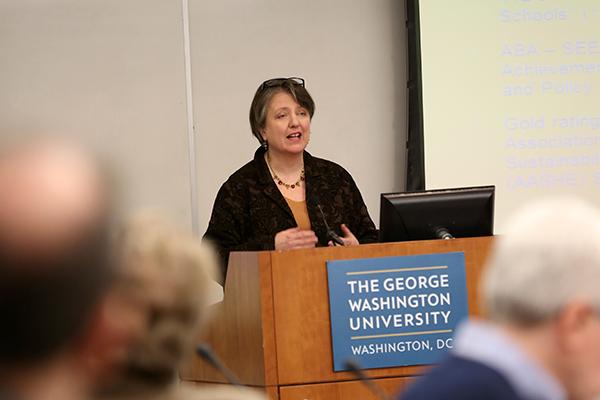The sustainability institute’s executive director wants to make GW the “go-to” institution for the federal government when it needs input on environmentally friendly practices.
Kathleen Merrigan outlined the direction she will take to make GW more prominent in sustainability research at Friday’s Faculty Senate meeting. By partnering with as many as 15 universities in the nation, she said GW will have more leverage to be awarded federal grants and further fund key projects.
The increased presence in sustainability research will give the University a more prominent name in the field, said Merrigan, who served as the second-highest official in the U.S. Department of Agriculture before coming to GW.
“I see GW really potentially being the gateway and go-to resource for the federal government on all things related to sustainability,” Merrigan said.
Given its location near government agencies, Merrigan said the University is in a good position to be the federal government’s top adviser on sustainable practices. She said she envisions GW acting as a liaison between the government and a network of universities focused on sustainability research.
Even if GW does not have research done on a specific topic, she said it could help refer federal officials to universities that do.
“That doesn’t mean we know everything, but we could be on speed-dial, so to speak,” she said.
The federal government is the largest energy user in the nation, Merrigan said. The New York Times reported that the government is responsible for about 1.5 percent of the nation’s annual energy consumption and gas emissions, and the government set a goal in 2010 to reduce its energy use and emissions by 28 percent.
“We’re going to get those calls [asking for advice in sustainability] more and more if we build our reputation,” she said.
Since her tenure at GW began about a year ago, Merrigan said she has been “benchmarking what GW is doing against other universities and colleges” in terms of research in the budding field.
She said faculty did apply for grants before she came to campus, but added that she is trying to “convene different people together that are recognized experts in the field… to sit around the table and explore what the questions of the day are.”
The next step, she said, is appealing to the federal government for grants. Working with other universities improves the credibility of the application and the chances of receiving the grant, she said.
When Merrigan worked at the Department of Agriculture, she said she had a big hand in awarding grants to firms and institutions.
“When you apply for a big federal grant, they want to see some evidence of collaboration at least, not that you threw the paper together at the last minute,” Merrigan said. “It’s not going to happen overnight, but it’s something we’re working on.”
The focus on research could contribute to GW’s larger sustainability plans, outlined in 2012, including goals to reduce carbon emissions by 40 percent by 2025.
Prior to coming to GW, Merrigan led the Agriculture, Food and Environment Program at Tufts University, where she said she still has strong connections to administrators. She also maintains contacts at universities like University of the District of Columbia and University of Michigan. Those institutions, among others, are the kinds of sustainability-driven schools she wants to see partner with GW, she added.
Merrigan also pointed to the 400 undergraduate and graduate courses that teach sustainability content and about 170 faculty members who actively conduct research in the field. She said those numbers prove that the University has the infrastructure needed to do the research for federal grants.
Faculty tend to focus most on energy, climate change, urban sustainability and food, Merrigan said.
Sustainability Program Director Lisa Benton-Short, who launched the University’s sustainability minor in fall 2013, said professors will be “an integral part of implementing the vision over the next several years.”
“We know federal agencies have a need for GW faculty and students to help solve a range of challenges – from sustainable supply chains, to reducing energy use, to making sure projects ensure social equity,” Benton-Short said.







